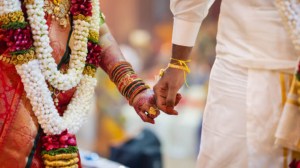With Maharashtra panel on tracking interfaith marriages, BJP eyes long game: Anti-conversion Bill
The state government’s decision to set up the 13-member committee comes in the wake of the Shraddha Walkar murder case.
 Since the Shraddha Walkar murder came to light here has been a clamour from the Hindutva brigade, including in Maharashtra, for more stringent laws governing interfaith relationships, or what it terms “love jihad”. (File)
Since the Shraddha Walkar murder came to light here has been a clamour from the Hindutva brigade, including in Maharashtra, for more stringent laws governing interfaith relationships, or what it terms “love jihad”. (File) The Maharashtra government’s decision to constitute a panel to track interfaith and intercaste couples has received Opposition backlash but for the ruling coalition of the BJP and the Eknath Shinde-led faction of the Shiv Sena, it dovetails with its larger political objectives in the run-up to crucial local body elections. These polls will set the tone for the crucial Lok Sabha and Assembly elections in 2024.
According to political observers, the 13-member committee led by state Women and Child Development Minister Mangal Prabhat Lodha, a former Mumbai BJP chief, will set the ground for a future bid to introduce an anti-religious conversion Bill. At least nine states — Chhattisgarh, Madhya Pradesh, Gujarat, Haryana, Himachal Pradesh, Karnataka, Uttar Pradesh, Uttarakhand, and Odisha — have anti-conversion laws in place.
Since the Shraddha Walkar murder came to light — she was brutally killed by her live-in partner Aftab Poonawala — there has been a clamour from the Hindutva brigade, including in Maharashtra, for more stringent laws governing interfaith relationships, or what it terms “love jihad”. It is a term often used by the Hindu right wing to allege a ploy by Muslim men to lure Hindu women into religious conversion through marriage.
The BJP and the Balasahebanchi Shiv Sena led by CM Shinde, according to insiders, believe there is a need to put in place a robust mechanism to tackle what it terms as instances of atrocities in interfaith and intercaste marriages and relationships. Last week, asked if the state would pass a law on “love jihad”, Deputy CM Devendra Fadnavis said the state government was studying laws on religious conversions passed by other states and had yet to take a call on such a law of its own.
Lodha, who is a firebrand Hindutva leader, on Tuesday said, “We don’t want our children who marry out of caste or religion to be completely cut off from their parents. Moreover, the state government will act only if there are grievances from a woman or their families.”
Starting in the 1980s, Maharashtra, through its social justice ministry, extended incentives for intercaste and interfaith marriages to break social barriers. A senior BJP functionary, requesting anonymity, said, “All this progressive state tag sounds good. But we cannot pretend to remain blind when a Hindu woman is killed by a Muslim man. Can you imagine what the woman went through? Now her family is in trauma. What is worse is there is no public reaction.”
The Opposition hit out at the government over its decision to set up the panel. Nationalist Congress Party (NCP) national spokesperson Clyde Crasto said, “Why have they talked about only interfaith and intercaste marriages? If they want to protect women against torture and crime, it should be inclusive. The fact that the government is restricting it to interfaith and intercaste marriages shows their hidden agenda to target some communities.”
Crasto went on to say, “There are several cases of mental harassment and physical torture subjected to women in marriages within the same caste and community. Many women in the state suffer from domestic violence and mental harassment, irrespective of whether they are in intercaste or interfaith marriages. Why have they skipped them?”
State Congress general secretary Sachin Sawant termed the decision to set up the committee as “inappropriate”. Sawant asked the government if it had data on intercaste marriages to substantiate the need for a committee.



- 01
- 02
- 03
- 04
- 05




























